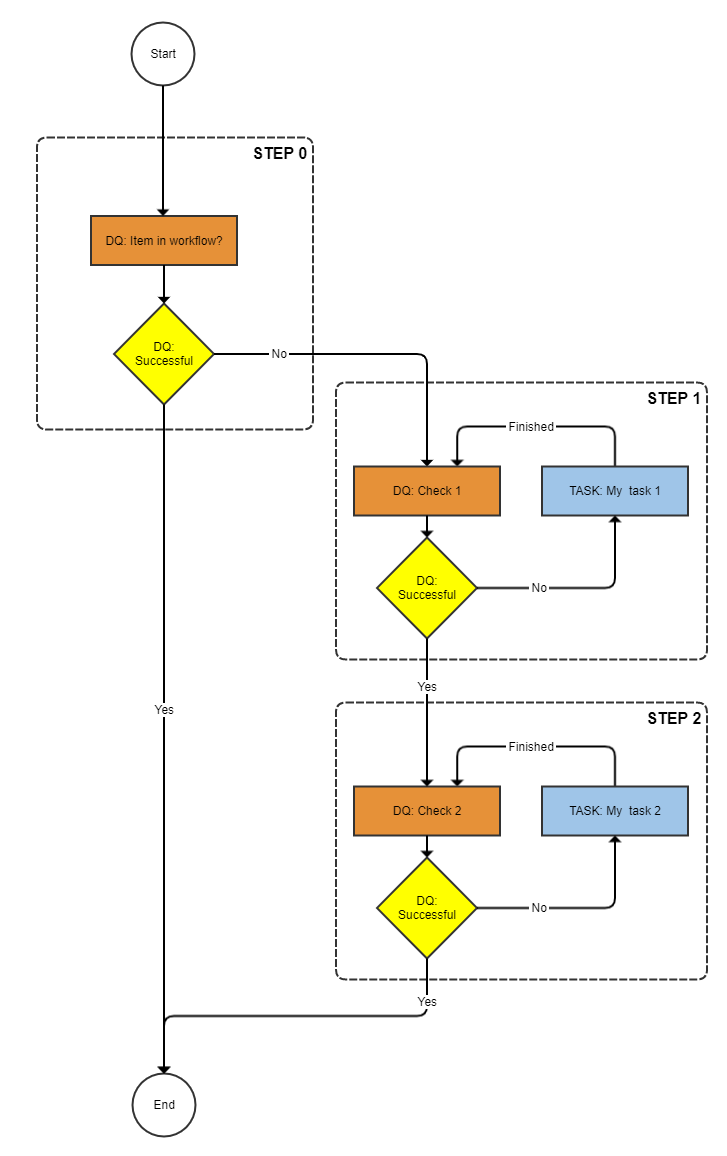Example 3 (2 Tasks with DQ checks)
The next example extends the previous example so that the tasks will only be created when the DQ check fails.
Diagram for example 3

Product 360 prerequisites for example 3
|
Product 360 entity |
value |
|
Usergroup |
Standardusers |
|
Ui Template |
Item approve UI |
|
DQ Channel |
Channel 1 |
|
DQ Channel |
Channel 2 |
Explanation of the steps example 3
|
Step |
Description |
|
0 |
Check whether item is already in this workflow. |
|
1 |
Run DQ check "Channel 1" if fail ==>put the item into the task "My task 1" |
|
2 |
Run DQ check "Channel 2" if fail ==>put the item into the task "My task 2" |
StepWorkflow.xml file for example 3
<?xml version="1.0" encoding="UTF-8"?><imp:payload xmlns:imp="http://www.informatica.com/schema/ItemMap" contentType="string"> <workflow> <label>Example Workflow 3</label> <identifier>Workflow_03</identifier> <version>1.0</version> <step> <id>0</id> <entity>Article</entity> <enterStatus>Never</enterStatus> <batchSize>500</batchSize> <executeDq>Always</executeDq> <dqService>ItemsInWorkflowTasks-Process</dqService> <dqFailStep>STEP:1</dqFailStep> </step> <step> <id>1</id> <entity>Article</entity> <workflowStatus>My task 1</workflowStatus> <description>My task 1</description> <workflowServiceEndpoint>StepWorkflow-Trigger</workflowServiceEndpoint> <enterStatus>OnDqResults</enterStatus> <batchSize>500</batchSize> <userType>userGroup</userType> <userName>Standardusers</userName> <uiTemplate>Item approve UI</uiTemplate> <executeDq>Always</executeDq> <dqService>ExecuteDqBatch-Process</dqService> <dqChannel>Channel 1</dqChannel> <nextStep>STEP:2</nextStep> </step> <step> <id>2</id> <entity>Article</entity> <workflowStatus>My task 2</workflowStatus> <description>My task 2</description> <workflowServiceEndpoint>StepWorkflow-Trigger</workflowServiceEndpoint> <enterStatus>OnDqResults</enterStatus> <batchSize>500</batchSize> <userType>userGroup</userType> <userName>Standardusers</userName> <uiTemplate>Item approve UI</uiTemplate> <executeDq>Always</executeDq> <dqService>ExecuteDqBatch-Process</dqService> <dqChannel>Channel 2</dqChannel> </step> </workflow></imp:payload>Detailed explanation of the steps
Only the differences to the previous example will be explained.
Step 0
Step 0 is an exact copy of the step 0 of the example 2.
Step 1
Step 1 is nearly the same as the step 1 of example 2. Only the differences are shown in the next table.
|
Key |
Value |
Description |
|
... |
... |
Same keys and values than in example 2. |
|
enterStatus |
OnDqResults |
The circumstances when an item should enter a status (task). In this case only when DQ check will fail! |
|
executeDq |
Always |
The circumstances when a DQ should be run. In this case always! |
|
dqService |
ExecuteDqBatch-Process |
The service name of the process that will be handle the processing of the dq. |
|
dqChannel |
Channel 1 |
Name of the DQ channel which will be executed. |
Step 2
Step 2 is nearly the same as the step 1 of the example above.
Only the differences are shown in the next table.
|
Key |
Value |
Description |
|
... |
... |
Same keys and values than in example 2. |
|
enterStatus |
OnDqResults |
The circumstances when an item should enter a status (task). In this case only when DQ check will fail! |
|
executeDq |
Always |
The circumstances when a DQ should be run. In this case always! |
|
dqService |
ExecuteDqBatch-Process |
The service name of the process that will be handle the processing of the DQ. |
|
dqChannel |
Channel 2 |
Name of the DQ channel which will be executed. |